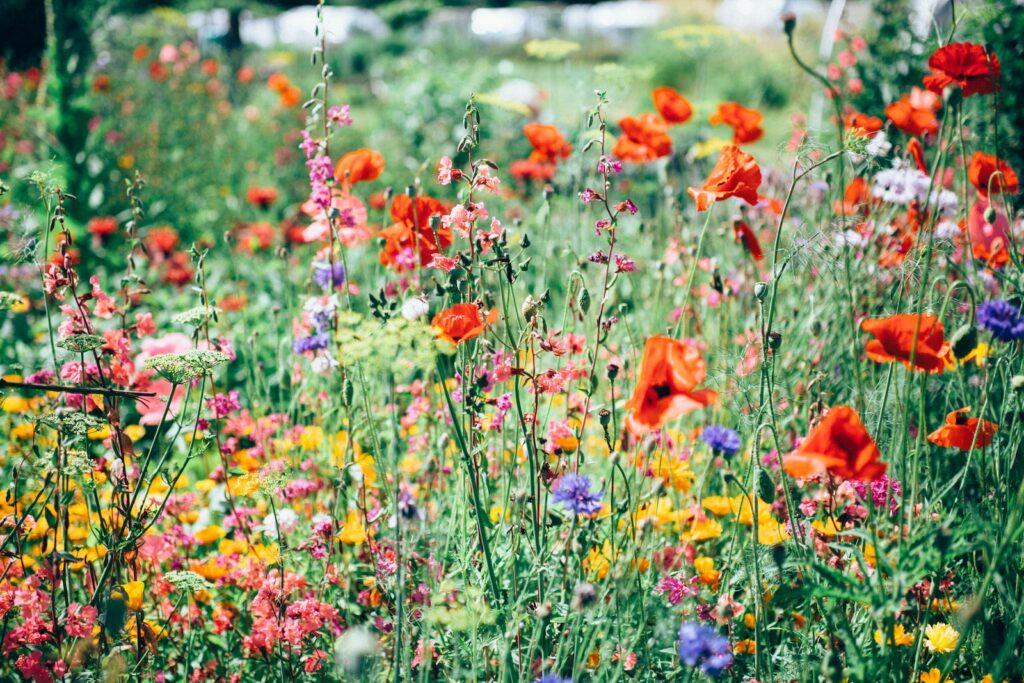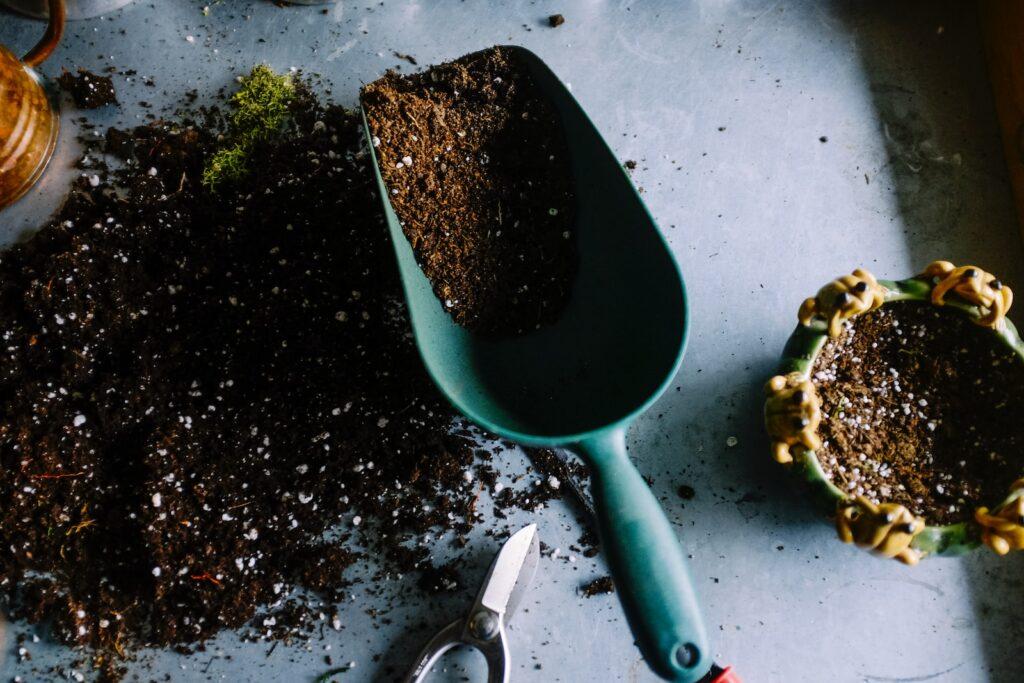Rated & Reviewed is reader-supported. When you buy through links on our site, we may earn an affiliate commission. Learn more.
Are you looking to upgrade your outdoor space but not sure where to start? Investing in quality outdoor furniture is the perfect way to create a comfortable and stylish environment for relaxation and entertainment. However, with so many options available, it can be overwhelming to choose the right pieces for your space. In this guide, we will provide you with everything you need to know to make an informed decision with our ultimate outdoor furniture guide.
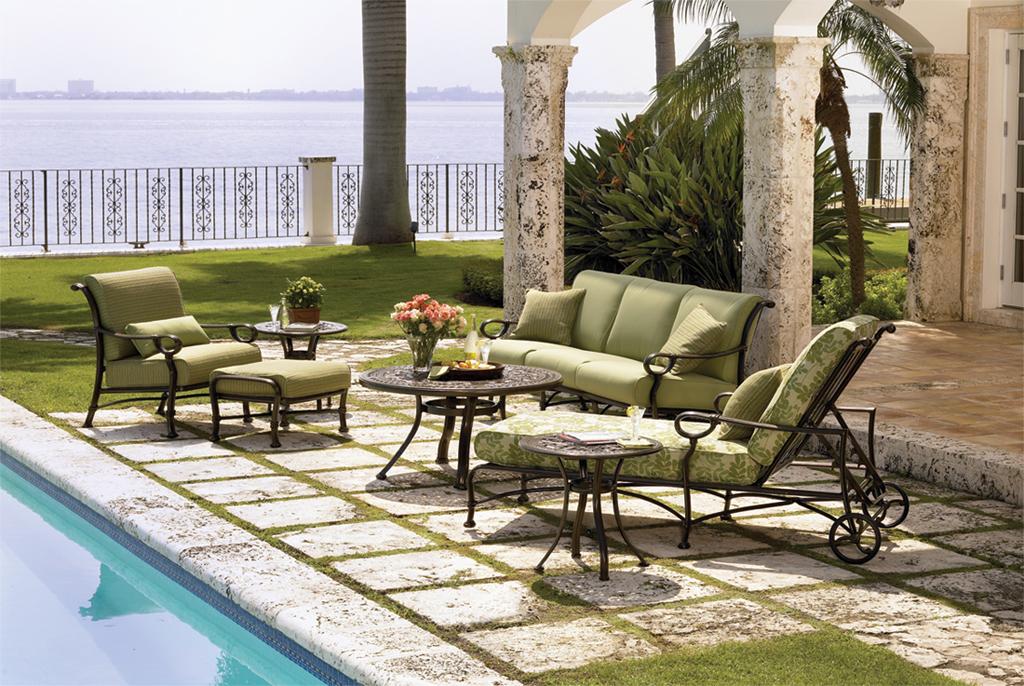
Types of Outdoor Furniture
Before choosing the right materials, it’s essential to determine what types of outdoor furniture you need. Here are some options to consider:
Patio Sets
Patio sets typically include a table and chairs, perfect for outdoor dining. They come in a variety of materials and styles, from classic to modern designs.
Lounge Chairs
Lounge chairs are perfect for relaxing by the pool or reading a book in the shade. They come in various sizes and styles, from chaise lounges to reclining chairs.
Benches
Benches are versatile and can serve as a seating option or a decorative element. They come in different materials and sizes, from small garden benches to large outdoor benches.
Hammocks
Hammocks are perfect for people who love to relax outdoors and take a nap. They come in different materials, from rope to fabric, and can be hung between two trees or on a stand.
Daybeds
Daybeds are a luxurious outdoor furniture option for lounging and relaxing. They come in different sizes and styles and often include a canopy for shade.
Adirondack Chairs
Adirondack chairs are a classic outdoor furniture option that provides comfort and style. They come in different materials and colors and can add a rustic charm to your outdoor space.
Dining Sets
Dining sets include a table and chairs, perfect for outdoor meals with family and friends. They come in a variety of materials and styles, from classic to modern designs.
Sectionals
Sectionals are outdoor furniture options that provide comfortable seating for a large group of people. They come in different materials and shapes, from curved to L-shaped designs.
Swing Sets
Swing sets are perfect for adding a playful element to your outdoor space. They come in different sizes and styles, from a simple wooden swing to a luxurious hanging daybed.
Umbrellas
Umbrellas are essential for providing shade and protection from the sun. They come in different sizes and styles, from freestanding to table umbrellas, and can be made from various materials.
Others
Other outdoor furniture options include fire pits, planters, and decorative elements. These elements can add a unique touch to your outdoor space and make it more inviting.
In the next section, we will discuss the different materials used in outdoor furniture and their pros and cons.
Outdoor Furniture Materials
When it comes to outdoor furniture, choosing the right materials is essential for durability and aesthetics. Here are some of the most common materials used in outdoor furniture:
Wood Outdoor Furniture
Wood is a classic outdoor furniture material, providing durability, beauty, and natural warmth. However, it requires maintenance to last long.
Teak
Teak is a high-quality wood that’s naturally resistant to outdoor elements and insects. It requires minimal maintenance and can last up to 50 years. However, it’s expensive and can be heavy to move.
Pros:
- Highly durable and weather-resistant
- Naturally resistant to decay, insects, and rot
- Ages beautifully over time
- Low maintenance
Cons:
- Expensive
- Can be heavy and difficult to move
- Can develop a silvery-gray patina if left untreated
Cedar
Cedar is a lightweight wood that’s naturally resistant to rot and insects. It has a beautiful natural hue that weathers to a silver-grey color over time. However, it’s soft and can easily scratch or dent.
Pros:
- Naturally resistant to decay and insects
- Lightweight and easy to move
- Affordable
- Has a natural aromatic scent
Cons:
- Not as durable as some other hardwoods
- Can develop cracks and splits over time if not treated properly
- Needs to be sealed or stained every few years
Eucalyptus
Eucalyptus is a sustainable and durable wood that’s resistant to rot and insects. It provides a beautiful reddish-brown hue and can be left outside year-round with proper maintenance. However, it’s prone to cracking and splitting.
Pros:
- Durable and weather-resistant
- Affordable
- Resistant to insects and decay
- Has a beautiful, reddish-brown color
Cons:
- Needs to be treated with oil or sealant to maintain its color and durability
- Can be heavy and difficult to move
- Can develop cracks and splits over time
Pine
Pine is a cost-effective and lightweight wood that’s easy to paint and stain. However, it’s soft and can easily scratch or dent. It’s best used in covered outdoor spaces.
Pros:
- Affordable
- Lightweight and easy to move
- Takes paint and stain well
- Resistant to shrinking and swelling
Cons:
- Not as durable as some other hardwoods
- Needs to be sealed or stained every few years
- Can develop knots and blemishes over time
Oak
Oak is a hard and durable wood that’s resistant to rot and insects. It provides a beautiful natural hue and is perfect for outdoor furniture that requires structural support. However, it can be expensive.
Pros:
- Durable and weather-resistant
- Ages beautifully over time
- Has a distinctive grain pattern
- Resistant to decay and insects
Cons:
- Expensive
- Can be heavy and difficult to move
- Needs to be treated with oil or sealant to maintain its durability
Bamboo
Bamboo is a sustainable and eco-friendly wood that’s lightweight and durable. It provides a natural aesthetic and is perfect for outdoor furniture that requires flexible elements. However, it can be prone to splitting and fading.
Pros:
- Fast-growing and eco-friendly
- Lightweight and easy to move
- Resistant to weather and insects
- Affordable
Cons:
- Not as durable as hardwoods
- Can be prone to cracks and splits over time
- Needs to be protected from moisture to prevent warping and rotting
Ipe
Ipe is a dense and durable wood that’s resistant to rot, insects, and weather elements. It provides a beautiful reddish-brown hue and can last up to 50 years with proper maintenance. However, it’s expensive and can be heavy to move.
Pros:
- Extremely durable and weather-resistant
- Resistant to insects and decay
- Has a beautiful, reddish-brown color
- Low maintenance
Cons:
- Expensive
- Can be heavy and difficult to move
- Needs to be sealed or oiled to maintain its color and durability
Metal Outdoor Furniture
Metal is a durable and sturdy outdoor furniture material that’s perfect for modern and industrial aesthetics. However, it can be prone to rusting and can be hot to the touch in direct sunlight.
Aluminum
Aluminum is lightweight, rust-resistant, and easy to move around. It provides a modern aesthetic and can be left outside year-round. However, it can be prone to dents and scratches.
Pros:
- Lightweight and easy to move
- Resistant to rust and corrosion
- Affordable
- Low maintenance
Cons:
- Can be prone to dents and scratches
- Not as sturdy as some other metals
- Can be affected by extreme temperatures
Steel
Steel is sturdy and durable, perfect for outdoor furniture that requires structural support. It provides an industrial aesthetic and is easy to clean. However, it’s prone to rusting and can be heavy to move around.
Pros:
- Durable and sturdy
- Affordable
- Can be powder-coated for added protection against rust and corrosion
Cons:
- Can rust if not protected properly
- Can be heavy and difficult to move
- Needs regular maintenance to protect against rust
Wrought Iron
Wrought iron is a classic outdoor furniture material that provides a timeless aesthetic. It’s durable and sturdy, perfect for outdoor furniture that requires structural support. However, it’s heavy and can be prone to rusting.
Pros:
- Highly durable and sturdy
- Has a classic and elegant look
- Resistant to rust and corrosion
Cons:
- Can be expensive
- Heavy and difficult to move
- Needs to be painted or powder-coated to prevent rust
Cast Iron
Cast iron is a heavy and durable outdoor furniture material that provides a classic aesthetic. It’s perfect for ornamental outdoor furniture but can be prone to rusting.
Pros:
- Durable and sturdy
- Has a classic and elegant look
- Resistant to rust and corrosion
Cons:
- Can be expensive
- Heavy and difficult to move
- Needs to be painted or powder-coated to prevent rust
Bronze
Bronze is a durable and beautiful outdoor furniture material that provides a classic and elegant aesthetic. It’s perfect for outdoor sculptures and can last for centuries. However, it’s expensive and can be heavy to move around.
Pros:
- Durable and weather-resistant
- Has a unique and elegant look
- Resistant to rust and corrosion
Cons:
- Expensive
- Heavy and difficult to move
- Needs regular maintenance to prevent tarnishing
Wicker Outdoor Furniture
Wicker is a natural or synthetic material that provides a classic and timeless outdoor furniture aesthetic. It’s perfect for outdoor chairs, sofas, and tables. However, it requires maintenance to last long.
Natural Wicker
Natural wicker is made from natural materials such as rattan, cane, or bamboo. It provides a beautiful and classic aesthetic and is perfect for outdoor furniture. However, it’s prone to fading and can be damaged by outdoor elements.
Pros:
- Has a natural and rustic look
- Lightweight and easy to move
- Can be painted or stained to match your decor
Cons:
- Not as durable as synthetic wicker
- Can be prone to unraveling and fraying over time
- Needs to be protected from moisture to prevent mold and mildew
Synthetic Wicker
Synthetic wicker is made from synthetic materials such as resin or plastic. It provides a similar aesthetic to natural wicker but is more durable and weather-resistant. However, it can be prone to fading and can be less comfortable than natural wicker.
Pros:
- Highly durable and weather-resistant
- Can mimic the look of natural wicker
- Easy to clean and maintain
Cons:
- Can be expensive
- Can develop cracks and splits over time
- Needs to be protected from UV rays to prevent fading
Plastic Outdoor Furniture
Plastic is a cost-effective and durable outdoor furniture material that comes in a variety of colors and styles. It’s perfect for outdoor furniture that requires easy maintenance.
Resin
Resin is a synthetic material that provides a durable and weather-resistant outdoor furniture option. It’s perfect for outdoor chairs, tables, and lounges. However, it can be prone to fading and can be less comfortable than other materials.
Pros:
- Affordable
- Lightweight and easy to move
- Resistant to weather and UV rays
- Low maintenance
Cons:
- Can fade or discolor over time
- Not as durable as some other materials
- Can crack or break if exposed to extreme temperatures
Recycled Plastic
Recycled plastic is an eco-friendly and sustainable outdoor furniture material that provides durability and easy maintenance. It’s perfect for outdoor furniture that requires a modern aesthetic. However, it can be prone to fading and can be less comfortable than other materials.
Pros:
- Eco-friendly
- Highly durable and weather-resistant
- Resistant to fading and discoloration
- Low maintenance
Cons:
- Can be expensive
- Limited color options
- Can be prone to surface scratches
Outdoor Furniture Upholstery
Upholstery is the material used for cushions, pillows, and fabrics used in outdoor furniture. It’s essential to choose fabrics that are durable and weather-resistant.
Outdoor Fabrics
Outdoor fabrics are treated to resist fading, stains, and moisture. They come in various colors and styles and are perfect for outdoor furniture cushions, pillows, and curtains.
Foam
Foam is used to provide cushioning in outdoor furniture. It’s essential to choose foam that’s water-resistant and mold-resistant to ensure durability.
Cushion Covers
Cushion covers are used to protect outdoor furniture cushions from outdoor elements. They come in various colors and styles, and it’s essential to choose covers that are weather-resistant and easy to clean.
In the next section, we will discuss how to choose the right pieces for your outdoor space.
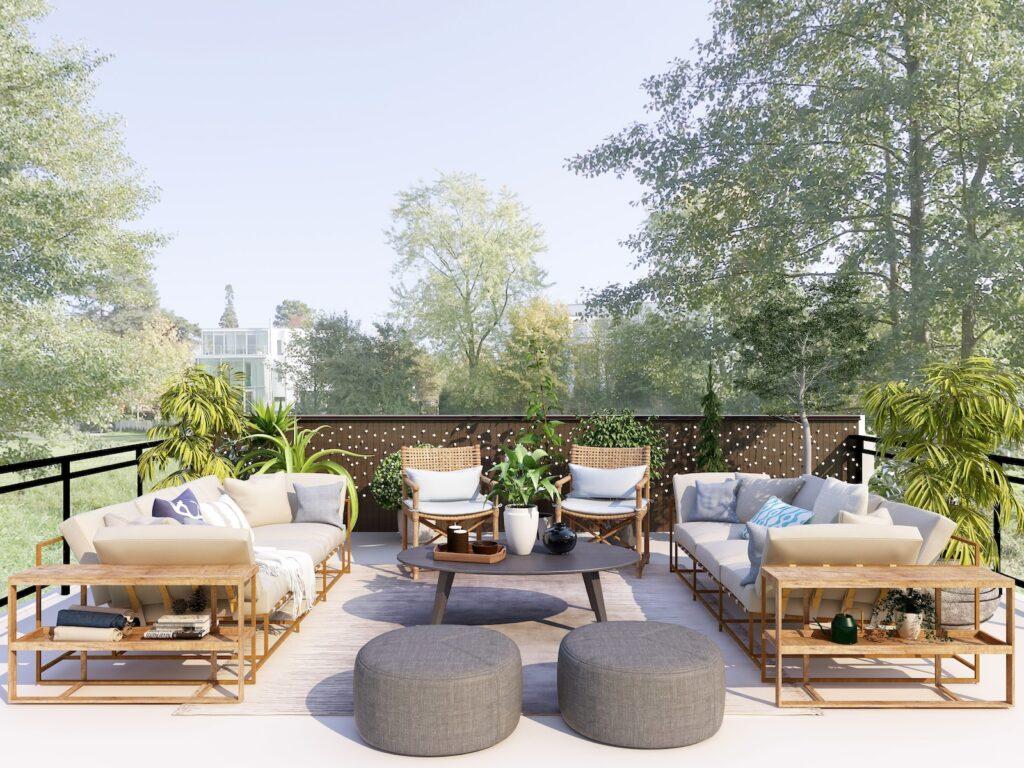
Choosing the Right Pieces for Your Space
When choosing outdoor furniture, it’s crucial to pick the right pieces that fit your space. Here are some factors to consider:
Size and Scale
Measure your outdoor space and consider the size and scale of the furniture. Oversized furniture can make a small space look cluttered, while small furniture can get lost in a large area.
Functional Needs
Consider the function of your outdoor space and select furniture that meets your needs. If you plan on hosting outdoor dinners, a dining set is a must, while lounge chairs are perfect for sunbathing and reading.
Style and Design
Choose furniture that complements your home’s aesthetic, whether it’s classic, modern, or bohemian. Look for pieces that match your home’s color palette and overall design.
Color Coordination
Choose furniture that complements the color of your outdoor space. If you have a lot of greenery, consider furniture in warm tones, while cool tones work well in a minimalist space.
Tips for Arranging
Consider the layout of your outdoor space and arrange furniture in a way that maximizes comfort and functionality. Arrange seating around a focal point, such as a fire pit, and leave enough space for movement.
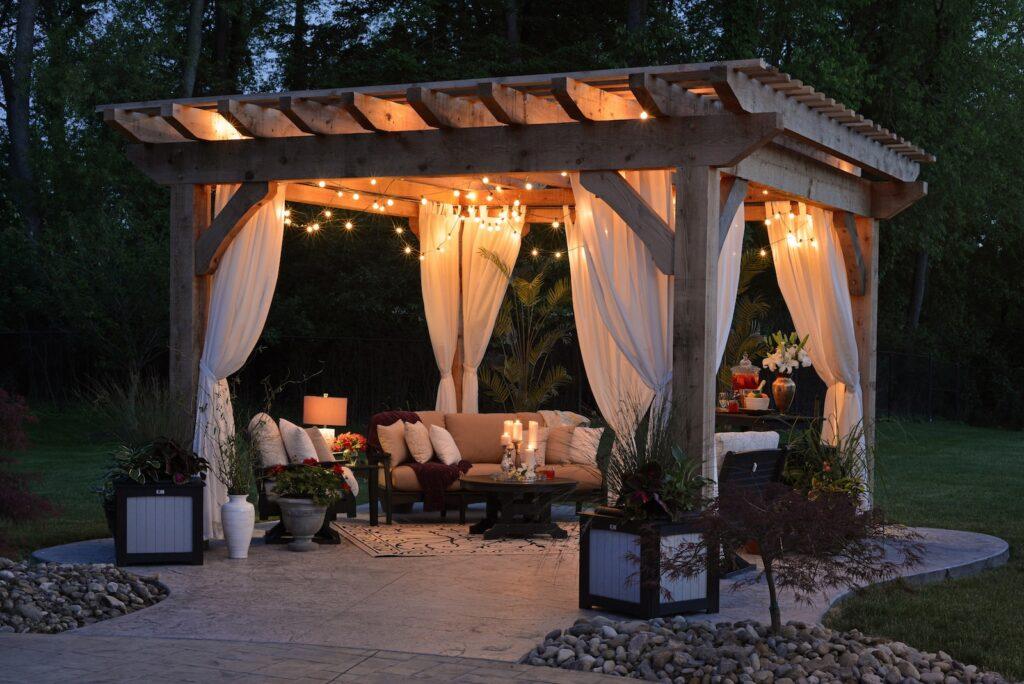
Outdoor Furniture Maintenance
Outdoor furniture requires proper maintenance to keep it looking its best and extend its lifespan. Here are some maintenance tips to consider:
Cleaning and Upkeep
Regularly clean your outdoor furniture to prevent buildup of dirt and grime. Use a mild soap and water solution, and avoid harsh chemicals that can damage the furniture’s surface. Wipe down furniture after use and cover it during inclement weather.
Protecting from Outdoor Elements
Protect your furniture from outdoor elements such as sun, rain, and wind. Consider using furniture covers, umbrellas, or awnings to provide shade and shelter. Use outdoor-friendly fabrics and materials that can withstand the elements.
Storage During Off-Season
Store your outdoor furniture during the off-season to protect it from harsh weather conditions. Consider storing furniture in a dry, covered area such as a garage or shed.
Repair and Restoration
Regularly inspect your outdoor furniture for signs of damage and wear and tear. If necessary, repair or restore the furniture to keep it in good condition. Hire a professional for more complex repairs or restoration.
Frequently Asked Questions
What are the best materials for outdoor furniture?
The best materials for outdoor furniture depend on your needs and preferences. Some popular options include teak, aluminum, wicker, and plastic.
How do I choose the right pieces for my outdoor space?
Consider the size and scale of your outdoor space, your functional needs, style and design, and color coordination when choosing outdoor furniture.
What is the best way to maintain outdoor furniture?
Regularly clean and upkeep your outdoor furniture with mild soap and water and avoid harsh chemicals. Protect furniture from the elements and store it during the off-season.
How do I protect outdoor furniture from weather damage?
Protect outdoor furniture from weather damage by using furniture covers, umbrellas, or awnings to provide shade and shelter. Use outdoor-friendly fabrics and materials that can withstand the elements.
How often should I replace outdoor furniture?
The lifespan of outdoor furniture depends on the materials used and how well it’s maintained. Quality outdoor furniture can last for many years with proper maintenance, while lower quality furniture may need to be replaced more frequently.
Related Articles
- Choosing the Right Size Outdoor Dining Set: A Comprehensive Guide
- Outdoor Entertaining Tips and Tricks
- Cleaning Outdoor Furniture: Tips and Tricks to Keep Your Decor Looking Like New
- DIY Outdoor Furniture and Decor: Easy and Affordable Projects
- Outdoor Furniture and Decor | How to Choose the Perfect Products
Wrapping It Up
Choosing the right outdoor furniture can make a significant difference in your outdoor space’s comfort and aesthetics. With this guide, you now have the knowledge to make an informed decision when buying outdoor furniture.
First, consider the different types of outdoor furniture available and determine which pieces will best suit your functional needs and style preferences. Then, choose the right materials that suit your climate and maintenance needs, ensuring that your furniture lasts for years to come.
Remember to take measurements of your outdoor space and choose pieces that are the right size and scale for your area. Lastly, don’t forget about maintenance, which is crucial for keeping your furniture looking great.
By following these tips, you can create an outdoor space that is not only functional but also stylish and comfortable. Whether you’re looking to dine al fresco or relax in the sun, the right outdoor furniture can make all the difference.
We hope this guide has provided you with the information you need to buy the perfect outdoor furniture for your needs. Happy shopping!
Amazon and the Amazon logo are trademarks of Amazon.com, Inc, or its affiliates.

